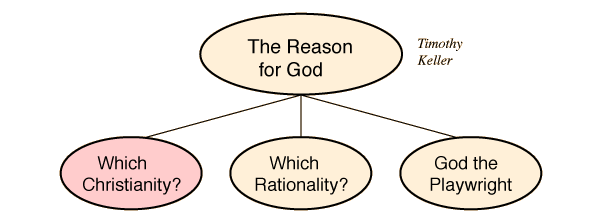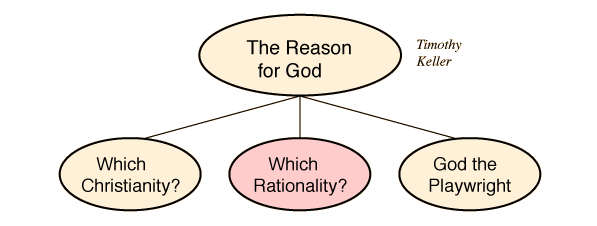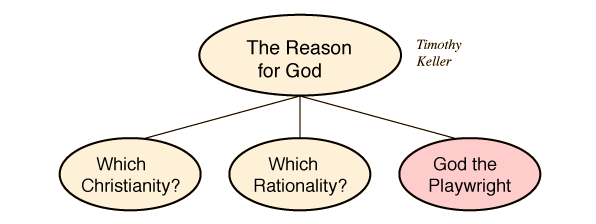Timothy Keller

Intermission - Christianity and "Sufficient" Reason
| The first priority is to bring persons to Jesus, not to the details of a particular denomination. |
Isaiah 1:18
- The absence of sufficient reasons to disbelieve in Christianity is not the same as the existence of sufficient reasons to believe in it.
- So how do we define Christianity and "sufficient"?
- Christianity and Reason
- Christianity: The body of believers who assent to the great ecumenical creeds.
- Apostles, Nicene, Chalcedonian and Athanasian
- A Triune God who created the world and humanity that fell into sin to be saved by the death an resurrection of a fully human and divine Jesus who will return to renew heaven and earth.
- Reason for God is not denominational - He looks at Christianity in general.
| You can't absolutely prove the existence of God or the particulars of Christian faith - that's why the word "faith" is in there. |
- Sufficient - or what does it mean to be rational?
- Many contemporary challenges (eg. the new atheists) apply "strong rationalism."
- No one should believe a proposition unless it can be proved rationally by logic or empirically by sense experience.
- Called the "Verification Principle".
- Hence "proved" means that an argument is so strong that no person whose logical faculties are operating properly would have any reason for disbelieving it.
- Atheists and agnostics often ask for this kind of proof - but they are not alone.
- Some Christians claim their arguments for faith are so strong that all who reject them are simply closing their minds to the Truth out of fear or stubbornness.
- The great majority of philosophers today think that "strong rationalism" is nearly impossible to defend.
- First, it doesn't live up to its own requirements.
- How to you empirically prove that you need empirical proof?
- This reveals "strong rationalism" to be a belief.
- Second, it assumes you can find a perspective of complete objectivity.
- But everyone comes to these questions with experience and background that color our thoughts.
- Philosopher Thomas Nagel, an atheist, admits in his book "The Last Word " that he cannot come to the question of God in anything like a detached way.
- In the real world, if we were a judge, we would recuse ourselves. But we can't!
- The adherence to "strong rationalism" is one reason why the recent crop of atheist books (Dawkins, Harris, Dennett, Hitchens) have fared so poorly in the scholarly journals.
- But it we reject "strong rationalism," must we go all the way to relativism?
|
Index |


